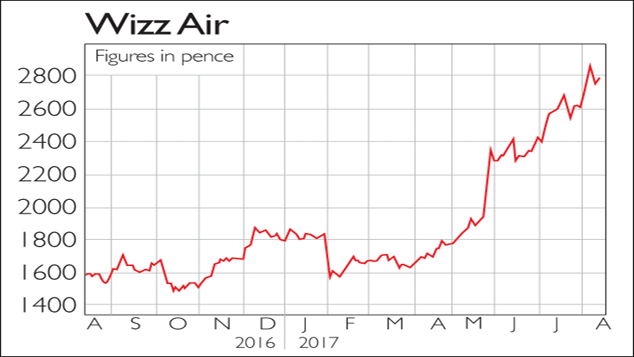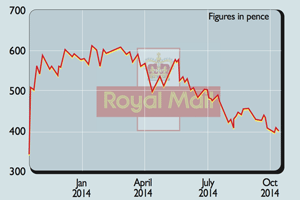Company in the news: Royal Mail Group
Royal Mail shares looked tempting before the float. But, now the shares have risen in price, is it too late to buy? Phil Oakley reports.
Get the latest financial news, insights and expert analysis from our award-winning MoneyWeek team, to help you understand what really matters when it comes to your finances.
You are now subscribed
Your newsletter sign-up was successful
Want to add more newsletters?

Twice daily
MoneyWeek
Get the latest financial news, insights and expert analysis from our award-winning MoneyWeek team, to help you understand what really matters when it comes to your finances.

Four times a week
Look After My Bills
Sign up to our free money-saving newsletter, filled with the latest news and expert advice to help you find the best tips and deals for managing your bills. Start saving today!
A few weeks ago, I said that Royal Mail shares looked tempting, given the big dividend yield they offered. However, I am surprised at just how much they have gone up in the first few days of trading.
Various City brokers have claimed the shares were undervalued at the flotation price of 330p. They have pointed to things such as the possibility of a big potential windfall from selling surplus London properties. On the basis of a few days trading, it looks as if they were right, but are the shares still worth buying now?
With a starting annual dividend of £200m, the shares offered a yield of 6.1% at 330p. Now at 480p that yield is down to 4.2%. That's OK, but I can buy other, arguably safer, blue-chip shares, such as National Grid (LSE: NG) or GlaxoSmithKline (LSE: GSK), with higher yields than this.
MoneyWeek
Subscribe to MoneyWeek today and get your first six magazine issues absolutely FREE

Sign up to Money Morning
Don't miss the latest investment and personal finances news, market analysis, plus money-saving tips with our free twice-daily newsletter
Don't miss the latest investment and personal finances news, market analysis, plus money-saving tips with our free twice-daily newsletter
It all comes down to how fast Royal Mail's dividends can grow in the future. You could argue that payouts have the potential to grow substantially. The main reasons for this are twofold: profits can keep going up as the business cuts costs.
Cash flows will surge as the heavy investment in making the business more efficient in recent years comes to an end. Throw in the fact that the firm won't pay much tax for a long time and you can paint a bullish picture for the shares.
Alternatively, strong cash inflows can be used to pay off the company's £1bn debts. This will increase the value of the shareholder's equity just like paying off a mortgage and could be another reason for the share price going higher. But the risks have not gone away.
The letters business is declining and the unionised workforce could still cause trouble even though their shares are worth a lot more than they were a few days ago.
The problem for most private investors is that they were only able to get their hands on £750 worth of shares at the flotation. That's probably not enough to make a big difference to them or produce a decent income stream. That said, the shares could still do well in the long run, but I'd wait for some of the early froth to be blown off before buying any more.
Verdict: wait for the shares to fall back
Get the latest financial news, insights and expert analysis from our award-winning MoneyWeek team, to help you understand what really matters when it comes to your finances.
Phil spent 13 years as an investment analyst for both stockbroking and fund management companies.
-
 Inheritance tax investigations net HMRC an extra £246m from bereaved families
Inheritance tax investigations net HMRC an extra £246m from bereaved familiesHMRC embarked on almost 4,000 probes into unpaid inheritance tax in the year to last April, new figures show, in an increasingly tough crackdown on families it thinks have tried to evade their full bill
-
 Average UK house price reaches £300,000 for first time, Halifax says
Average UK house price reaches £300,000 for first time, Halifax saysWhile the average house price has topped £300k, regional disparities still remain, Halifax finds.
-
 Royal Mail’s 7.2% dividend yield is now under threat
Royal Mail’s 7.2% dividend yield is now under threatTips Royal Mail's dividend yield is coming under pressure as costs rise and delivery volumes fall. Profits are under threat, and investors can't take anything for granted, says Rupert Hargreaves.
-
Share tips of the week
Features MoneyWeek’s comprehensive guide to the best of this week’s share tips from the rest of the UK's financial pages.
-
 If you’d invested in: Wizz Air and Royal Mail
If you’d invested in: Wizz Air and Royal MailFeatures Wizz Air is the largest low-cost airline in central and eastern Europe – and it is flying high.
-
Company in the news: Royal Mail
Features Phil Oakley explains what the dramatic collapse of competitor City Link means for Royal Mail.
-
 Shares in focus: Can Royal Mail deliver profits?
Shares in focus: Can Royal Mail deliver profits?Features Pessimism surrounds the mail service’s prospects. Is it overblown, and should you buy the shares? Phil Oakley investigates.
-
Company in the news: Royal Mail Group
Features Shares in Royal Mail were a steal at their flotation price, but have now fallen back as the company has run into a few problems. Phil Oakley asks if it's time to buy.
-
Was the Royal Mail sold off too cheaply?
Features Was the British public betrayed by an overzealous government in the Royal Mail sell-off? Emily Hohler reports.
-
Royal Mail shares soar to new highs - should you bank profits?
Features As ‘unconditional trading’ starts in Royal Mail shares, the price has soared to new highs. Ed Bowsher looks at whether you should sell now, or hold on to them.